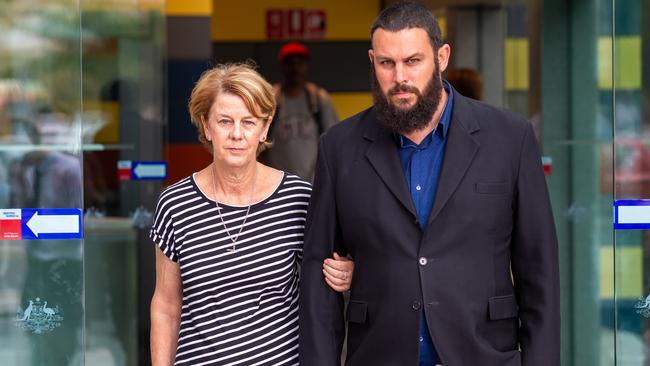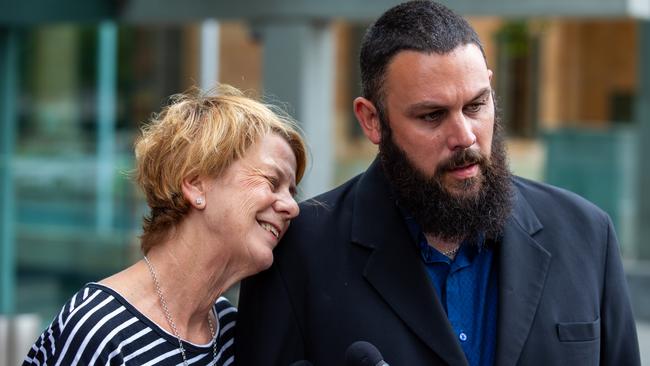Royal commission into aged care opens in Adelaide: Whistleblowers call for register of dodgy workers
A national register of dodgy carers should be established to prevent “unsuitable workers” moving between elder care facilities, Oakden crusader Barb Spriggs has told the Royal Commission into Aged Care.
National
Don't miss out on the headlines from National. Followed categories will be added to My News.
- Home care cash plea as royal commission opens
- Oakden whistleblower Barb Spriggs to be first witness
- Fewer than 5% of aged care providers respond to royal commission
A national register of dodgy carers should be established to prevent “unsuitable workers” moving between elder care facilities, Oakden crusader Barb Spriggs has told a Royal Commission in Adelaide.
Ms Spriggs and her son Clive told the first public hearing of the Royal Commission into Aged Care Quality and Safety that providers should have to check a national database, which highlights care concerns and “red flags” before hiring employees.
The royal commission also heard barring non-compliant providers or financial penalties should be considered for nursing homes that failed to meet standards.
Council of the Ageing chief executive Ian Yates suggested further penalties for sanctioned facilities be considered on top of the current punishment, which is a six-month ban on Commonwealth subsidies for new patients.

“There are lots of legal issues in doing that but I think having a conversation about what kind of compliance and sanction powers such an agency could usefully have in the sector would be worthwhile,” he said.
Ms Spriggs’ husband Bob suffered unexplained bruising and received 10 times the recommended dose of his medication during a short stay at the now condemned Oakden nursing home.
She told the royal commission that there needed to be “more accountability” when failings occurred in the sector.
“If an aged care worker does something wrong, this should be documented in a national database,” Ms Spriggs said.
“Future employers should be able to see that there is a mark against their name in the system.
Hopefully, this will stop unsuitable workers with bad traits moving to other facilities, including interstate.”
Mr Spriggs agreed, telling the commission that workers should have a “mark on their name” when they delivered substandard care.
“Despite everything that my family has been through, nobody has been made accountable for what happened to my Dad,” he said.
“ There were people running Oakden while it was deemed an unsafe, unfit environment. Staff and management of Oakden may have lost their jobs when it closed but where are they now? Are they in another State?
“ Are they going to be repeating what they did to someone else? There needs to be a mark on their name in the system.”

Federal Aged Care Minister Ken Wyatt would not be drawn on the Spriggs’ recommendation until the royal commission had concluded.
“The Government established the royal commission to allow the airing of valuable feedback, experiences and ideas. We look forward to the outcomes and considering the recommendations,” he said.
Leading Age Services Australia chief executive Sean Rooney said a “range of measures” to ensure the workforce was appropriately skilled and of the right character were under consideration, including accreditation process overhauls, centralised registration of all care staff and a national code of conduct.
Mr Spriggs urged other Australians to come forward with their stories, saying it was a “prime opportunity” to shine a light on issues in the sector.
“I think it (our evidence) is our way of handing over to the royal commission our points of view, what we need changed,” he said.
“It’s up to them and for Australians this is such an important time for aged care.”
Earlier it emerged that 21 of the country’s top aged care providers had yet to respond to the royal commission, despite a mid-January deadline for their submissions.
In his opening address to the Royal Commission into Aged Care Quality and Safety, Counsel Assisting Peter Gray QC said more than 900 of 1982 providers across the country had responded, including 79 of the largest 100 companies.
A preliminary hearing last month heard that just 83 of the 1982 providers had responded.
Mr Gray told the first public hearing, in Adelaide, that the royal commission had received more than 800 public submissions.
“Many of these accounts relate to substandard or unsafe aged care services,” he said.
“A similar proportion raise concerns about staffing levels, including the ratio of staff to care recipients in aged care.”
He said many submissions were “critical of specific aged care providers and give accounts of the role of the regulator”, but those submissions would not be heard by the commission until later in the year.
“In later hearings we will lead evidence from people who are expected to make specific allegations about a particular provider, regulator or some other person,” he said.
“In such cases, advance notice will be given where possible, and the affected provider or person will be given an opportunity to respond.”
The first two weeks of hearings are devoted to understanding how the aged care system does and is supposed to operate, before focusing on home care in hearings beginning in March.
Hearings in May will focus on certain parts of residential care, with a particular focus on dementia.
Mr Gray said understanding the aged care system as it currently exists is “no simple matter”.
He pointed out the frequency of reviews into the system and said the frequency of changes to it over the years may have led to “unintended complexity”.
“Too often the reforms made to aged care have been addressing a problem in isolation rather than the system as a whole,” he said.
“The sheer number and frequency of reviews shows that there are many issues in aged care which have not been resolved to the community’s satisfaction.”
The royal commission hopes to hear from 26 witnesses across its first eight days of hearings in Adelaide, presided over by commissioners Richard Tracey QC and Lynelle Briggs.
Originally published as Royal commission into aged care opens in Adelaide: Whistleblowers call for register of dodgy workers


